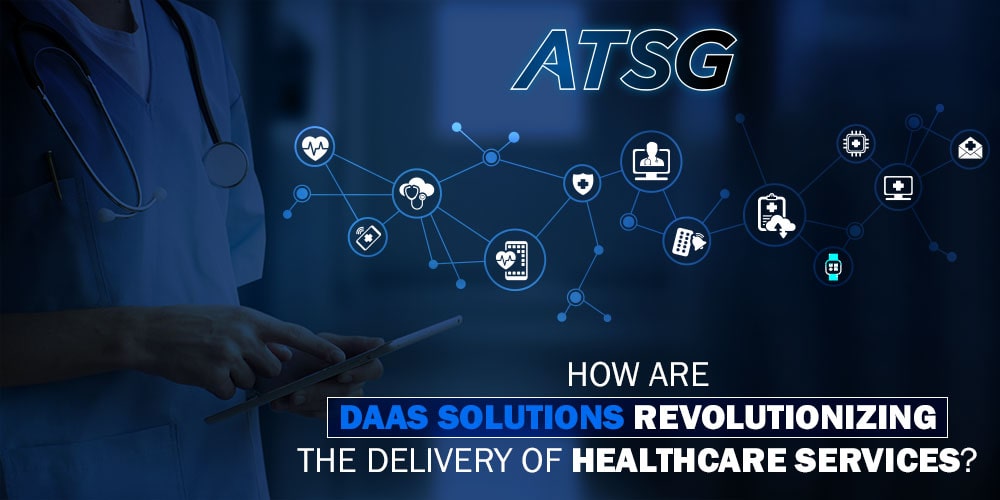Digital transformation has been a critical component of every organization’s technological advancement. However, healthcare providers have been lagging behind in terms of achieving technological evolution. One of the most suitable IT solutions that needs to be implemented across healthcare organizations is desktop-as-a-service or DaaS. It is considered a highly effective IT solution that renovates, reimagines and revamps the IT infrastructure of the deploying organization. With healthcare institutions pursuing rapid digital transformation, adopting DaaS solutions can prove a very effective step.

What is Desktop as a Service (DaaS)?
DaaS is a high-performing, secure and cost-effective type of desktop virtualization. Organizations can use DaaS to access virtual desktops over the internet from a cloud provider. DaaS is an effective cloud based solution to integrate across healthcare providing organizations. For the modern healthcare industry, desktop-as-a-service is the perfect solution to overcome multiple challenges.
The Impact of DaaS Solutions on Healthcare Providers
One of the main impacts of DaaS in healthcare is to improve patient care, as the solution is able to provide healthcare employees seamless access to the tools that enhance their services. DaaS enables healthcare providers to gain access to critical information and medical applications, irrespective of the device or location.
The faster the operations and processes of a healthcare concern, the better are the services that can be delivered. The goal of every healthcare provider is to ensure that its patients are well taken care of, and that it can improve the quality of life of the masses. DaaS gives them the technological resources and enabling environment to do just that.
Implementing DaaS solutions in healthcare deems to provide seamless and secure connectivity, which has the potential to improve operations, scalability, resilience, and care delivery experiences.
The Benefits of DaaS Solutions for Healthcare
DaaS can cater to healthcare sector’s needs by providing a secure and scalable platform for managing confidential and sensitive data, along with other features. The following list explores the advantages of integrating DaaS solutions for the providers of healthcare services:-
1. Enhanced Security: DaaS providers offer robust security measures, including encryption, multi-factor authentication (MFA) and other robust access controls. These control mechanisms protect sensitive patient data from cyber attacks. Additionally, as data is being stored in the cloud, it can be easily backed up and restored, in the event of a disaster or cyber attack.
2. Improved Collaboration: With DaaS, healthcare professionals can access their virtual desktops and medical applications from any device with an internet connection. This allows doctors, nurses and administrative staff to work remotely and collaborate more effectively, regardless of their location.
3. Cost Savings: DaaS eliminates the need for healthcare organizations to invest in expensive on-premise hardware and software infrastructure. Additionally, DaaS providers offer flexible pricing models, allowing healthcare organizations to scale their DaaS environments up or down as needed.
4. Regulatory Compliance: Healthcare institutions are subject to strict regulatory compliance. One such example is HIPAA, which governs the storage and transmission of sensitive patient data. DaaS providers offer robust regulatory compliance, which comes built-into the solution itself. As a result, healthcare providers can maintain the sanctity of medical records, and reduce the risk of hefty fines and other legal ramifications.
Challenges of Implementing DaaS in the Healthcare Sector
While Desktop-as-a-Service offers many benefits for the deploying healthcare institutions, there could still be some challenges at the initial stages of this transition.
A few of the most common challenges faced are listed down below.
Network Connectivity
DaaS relies heavily on a stable and reliable internet connectivity. If the network connectivity is slow or disturbed, it can cause latency issues, slow application response, and an overall degradation in service quality.
Compatibility Issues
Legacy applications may not be compatible with DaaS platforms, right out of the box. One of the reasons for this is that a lot of healthcare providers still rely heavily on legacy systems, primarily owing to regulatory and privacy concerns. This could result in problems for organizations that rely on specific software applications. It can take time and resources to resolve these compatibility issues.
Dependency on Service
Organizations that rely on DaaS solutions may at times experience latency, if there is some issue within the DaaS provider’s infrastructure. This is why it is imperative to choose a reliable and established service provider, such as ATSG.
Migration Challenges
Migrating data and legacy applications to a DaaS platform can be challenging, especially if the healthcare organization has a large and complex infrastructure. Proper planning and execution are essential to minimize downtime, and ensure a smooth migration process.
The Future of DaaS in the Healthcare Sector
The future of desktop as a service in the healthcare sector looks quite promising. DaaS continues to evolve and provide new opportunities for healthcare providers to improve patient care, reduce costs, and increase efficiency. Healthcare businesses are increasingly adopting DaaS for more flexible and cost-effective ways to manage their IT infrastructure.
With the advancement of technology and the capabilities DaaS offers, healthcare entities would be able to provide services through sophisticated and in-depth methods. DaaS solutions also help healthcare businesses to improve patient engagement by providing them with easy access to their health information, personalized care, and telemedicine services. The integration of DaaS features the growth of healthcare providers in all domains, whether it’s security, operational efficiency or regulatory compliance.
Opting for specialized DaaS providers enables healthcare organizations to focus more on core tasks, instead of maintaining their IT infrastructures. ATSG offers intelligent DaaS solutions through highly secure and compliant Equinix data centers. With DaaS, leading healthcare providers can deliver top notch medical services, without compromising on security, privacy or regulatory compliance.




